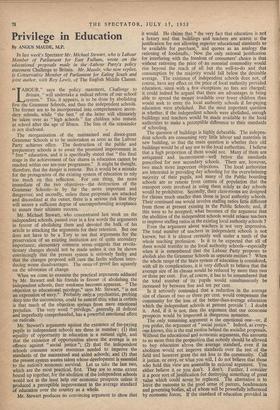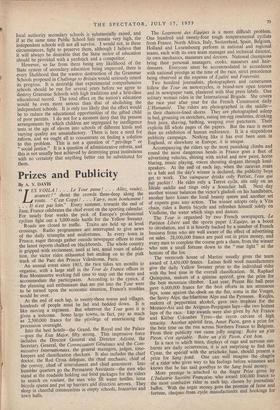Privilege in Education
By ANGUS MAUDE, M.P.
In last week's Spectator Mr. Michael Stewart, who is Labour Member of Parliament for East Fulham, wrote on the educational proposals made in the Labour Party's policy statement Challenge to Britain. Mr. Maude, who now replies, is Conservative Member of Parliament for Ealing South and joint author, with Roy Lewis, of The English Middle Classes.
"TABOUR," says the policy statement, Challenge to Britain, " will undertake a radical reform of our school system." This, it appears, is to be done by abolishing first the Grammar Schools, and then the independent schools. The former are to be incorporated into comprehensive secon- dary schools, while " the best " of the latter will ultimately be taken over as " high schools " for children who remain at school after the age of fifteen. The fate of the remainder is not disclosed.
The reorganisation of the maintained and direct-grant Grammar Schools is to be undertaken as soon as the Labour Party achieves office. The destruction of the public and preparatory schools is to await the promised improvement in " free " education, and it is specifically stated that " this final stage in the achievement of fair shares in education cannot be reached within our ten-year programme." It might be thought, therefore, that the danger is remote. But it would be a mistake for the protagonists of the existing system of education to rely too much on this reflection. For one thing, the more immediate of the two objectives—the destruction of the Grammar Schools—is by far the more important and dangerous; and secondly, unless these proposals are attacked and discredited at the outset, there is a serious risk that they will secure a sufficient degree of uncomprehending acceptance to ensure their ultimate success.
Mr. Michael Stewart, who concentrated last week on the independent schools, passed over in a few words the arguments in favour of abolishing them and devoted the bulk of his article to attacking the arguments for their retention. But one does not have to be a Tory to see that arguments for the preservation of an existing institution are of quite secondary importance; elementary common sense suggests that revolu- tionary changes should not be made unless it can be shown convincingly that the present system is seriously faulty and that the changes proposed will cure the faults without intro- ducing worse disadvantages. The onus of proof lies squarely on the advocates of change.
When we come to examine the practical arguments adduced by Mr. Stewart and his friends in favour of abolishing the independent schools, their weakness becomes apparent. " The objection to educational privilege," says Mr. Stewart, " is not an expression of envy." Probably only a psychiatrist, probing deep into the unconscious, could be sure of this; what is certain is that much of the objection springs from mere emotional prejudice. The very word " privilege," generally ill defined and imperfectly comprehended, has a powerful emotional effect on radicals.
Mr. Stewart's arguments against the existence of fee-paying pupils in independent schools are three in number: (1) that equality of opportunity in education is a natural right, and that the existence of opportunities above the average is an offence against " social justice "; (2) that the independent schools consume scarce resources needed to improve the standards of the maintained and aided schools; and (3) that the present system wastes talent whose development is essential to the nation's economic survival. Let us take the last two, which are the most practical, first. They are to some extent bound up together, for the abolition of the independent schools would not in the least help our economic prospects unless it produced a perceptible improvement in the average standard of education over the country as a whole.
Mr. Stewart produces no convincing argument to show that it would. He claims that " the very fact that education is not a luxury and that buildings and teachers are scarce is the justification for not allowing superior educational standards to be available for purchase," and quotes as an analogy the rationing of foodstuffs. Now the only rational justification for interfering with the freedom of consumers' choice is that without rationing the price of an essential commodity would rise beyond the reach of all but the well-to-do and that consumption by the majority would fall below the desirable average. The existence of independent schools does not, of course, have any effect on the price of local authority provided education, since with a few exceptions no fees are charged; it could indeed be argued that there are advantages in being able to spread the money available over fewer children than would seek to enter the local authority schools if fee-paying education were abolished. But the most important question is whether, if the independent schools were abolished, enough buildings and teachers would be made available to the local authorities to make a perceptible difference to their standards of schooling.
The question of buildings is highly debatable. The indepen. dent schools are consuming very little labour and materials in new building, so that the main question is whether their old buildings would be of any use to the local authorities. I believe that a high proportion of them would not. Many of them are antiquated and inconvenient—well below the standards prescribed for new secondary schools. There are, however, two much more important objections. The local authorities are interested in providing day schooling for the overwhelming majority of their pupils, and many of the Public boarding schools are so remote from centres of population that the transport costs involved in using them solely as day schools would be prohibitive. Secondly, their class-rooms are designed for classes much smaller than those in local authority schools. Their continued use would involve staffing ratios little different from those at present existing in the Public Schools; and, if this were to be accepted, what becomes of the argument that the abolition of the independent schools would release teachers to improve staffing ratios in the existing local authority schools ? Even the argument about teachers is not very impressive. The total number of teachers in independent schools is not known, but it is almost certainly well under a tenth of the whole teaching profession. Is it to be expected that all of them would transfer to the local authority schools—especially when it is remembered that the Labour Party proposes to abolish also the Grammar Schools as separate entities ? When the whole range of the State system of education is considered, with all its complications, it is very difficult to believe that the average size of its classes would be reduced by more than two or three per cent. For, of course, it has to be remembered that the total number of its pupils would simultaneously be increased by between five and ten per cent.
Is it seriously contended that a reduction in the average size of classes of two or three per cent. would compensate the community for the loss of the better-than-average education which the independent schools at present provide ? I doubt it. And, if it is not, then the argument that our economic prospects would be improved is dangerous nonsense. The only remaining argument j is the emotional one—or, if you prefer, the argument of " social justice." Indeed, as every- one knows, this is the real motive behind the socialist proposals. Without the educational and economic arguments, this amounts to no more than the proposition that nobody should be allowed to buy education above the average standard, even if its abolition would not improve standards over the rest of the field and however great the net loss to the community. Call it justice, or envy, or what you will, I do not believe that those who hold this view are amenable to rational argument. You either believe it or you don't. I don't. Further, I consider it a poor sort of justification for destroying something of great value which could never be replaced. The alternative is to leave the outcome to the good sense of parents, headmasters and governing bodies, all of whom will be powerfully influenced by economic forces. If the standard of education provided in local authority secondary schools is substantially raised, and if at the same time Public School fees remain very high, the independent schools will not all survive. I would not, in these circumstances, fight to preserve them, although I believe that it will always be desirable that the State sector of education should be provided with a yardstick and a competitor.
However, so far from there being any likelihood of the State system of secondary education being improved, .there is every likelihood that the wanton destruction of the Grammar Schools proposed in Challenge to Britain would seriously retard its progress. It is desirable that experimental comprehensive schools should be run for several years before we agree to destroy Grammar Schools with high traditions and a first-class educational record. The total effect on the nation's education would be even more serious than that of abolishing the independent schools. It is only too likely that the effect would be to reduce the educational opportunities of the gifted child of poor parents. I do not for a moment deny that the present arrangements by which children are segregated by intelligence tests at the age of eleven into schools of different kinds and varying quality are unsatisfactory. There is here a need for reform, and we ought all to concentrate on finding a solution to this problem. This is not a question of " privilege " or " social justice." It is a question of administrative reform, and this is not usually best achieved by destroying great institutions with no certainty that anything better can be substituted for them.



























 Previous page
Previous page